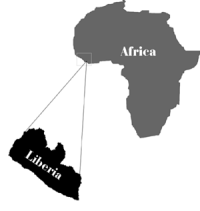Sharpton in Africa to address Liberian crisis

ACCRA, Ghana (FinalCall.com)–The effort to hammer out an agreement to stop the heavy fighting in Monrovia moved slowly here July 21, even as word circulated that rebel forces on the ground in the Liberian capital city were resisting any effort to stop their forward motion toward the residence of President Charles Taylor.

The Rev. Al Sharpton, who heads a delegation of U.S. clergy here on a mission to deliver humanitarian aid to Liberia, met with the various factions and representatives of the Taylor administration throughout the day seeking a solution to stop the fighting, since it was the fighting that has prevented the delegation from entering Monrovia as planned.
Members of the delegation include Minister A. Akbar Muhammad, international representative of the Nation of Islam, Rev. Al Sampson of Chicago’s Fernwood Methodist Church and Dr. Cornel West of Princeton University.
Speaking to The Final Call here, General Joe Wylie, a military leader of the LURD (Liberians United for Reconciliation and Democracy) rebel movement whose representatives had met with Rev. Sharpton, said the peace process has been bogged down due to the involvement of political parties. The ceasefire first must be established through the warring factions, he said.
“Political parties have no reason to be here in the first place. They’re confusing the situation, that’s why the process is taking so long,” he said.
He explained that there are just a few main rebel groups involved in the fighting that need to agree on the process, but the addition of political interests cause delays through increased meetings with delegates and more time needed to reach agreements.
The rebel general said all movements are in agreement that only Pres. Taylor’s departure from the city would stop the fighting, but the likelihood of the president leaving alive grows increasingly unlikely without a stabilizing outside military force entering the city to assure a safe exit.
If Mr. Taylor is captured he would be subjected to a military trial, the general said.
Gen. Wylie also dismissed news reports and even Mr. Taylor’s description of the LURD movement as an effort to put a Muslim into leadership of the country.
“Those who worry about the Islamic question don’t know the history of Liberia. It’s nearly impossible to put a Muslim in because of the dominance of Christians. It’s a propaganda piece to scare people,” he said.
Gen. Wiley said the chairman of LURD is a Muslim, but “we all agree that he cannot be president.”
A sticking point in the process is a stipulation that no member of the warring factions can have a leadership role in the interim government. A counterproposal has been offered but not yet agreed upon that a vice president position be created for the three rebel movements.
“If these political parties continue to give problems instead of giving meaningful suggestions on the formation of an interim government that appeals to all of us, MODEL will pull out of these peace talks,” said Tia Slanger, a spokesperson for MODEL (Movement for Democracy in Liberia).
Angered at the increased casualties and the slow response to the violence of the U.S. Government, Marie Parker, a member of the Mono River Women’s Union Movement who had been in Monrovia a few days ago, told The Final Call that if Mr. Taylor leaves without a stabilizing force in place, “there will be total chaos.”
She also wondered who is supplying the rebel forces with weapons even as the Taylor troops are running out of ammunition due to arms sanctions on the West African nation.
“Some superpower is supplying MODEL and LURD with arms and it’s time it stops,” she said referring to the rebel groups.
On July 20, residents of Monrovia piled dead bodies in front of the U.S. Embassy there to show their anger at the Bush administration’s decision not to send in troops.
Following a day of dialogue and negotiations, Rev. Sharpton told Ghanaians during a live interview on the “Good Evening, Ghana” national television program that it bothered him that the United States and the international community are putting the innocent people who are dying in Liberia “in a marginal light instead of them being a priority.”
“Why not have 500-1,000 U.S. troops go in with (ECOMOG) immediately to make sure that humanitarian aid gets through,” he said of the West African peacekeeping force. “If this was going on anywhere else in the world, we would not be this slow to respond.”
Rev. Sharpton, a candidate for the Democratic Party’s nomination as candidate for president, said Africa needs debt relief and a new relationship with the international monetary institutions that exploit the continent’s human and natural resources.












